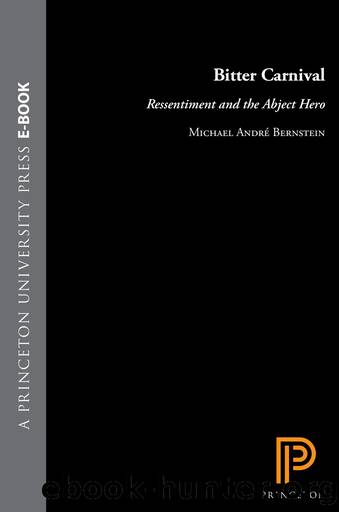Bitter Carnival by Michael Andr Bernstein;

Author:Michael Andr Bernstein; [Bernstein;, Michael Andr]
Language: eng
Format: epub
ISBN: 9781400820634
Publisher: Princeton UP
Published: 2022-09-15T00:00:00+00:00
Six
These Children That Come at You with Knives: Charles Manson and the Modern Saturnalia
nerves wired with the prophecies
of one more West Coast lumpen Raskolnikov.
(Moses Elch Brugger, âRevolutions Beforeâ)
Psychopaths like myself emerge when societies are about to change.
(Ira Einhorn, Campaign Speech:
1971 Philadelphia Mayoral Election)
WHEN Ivan Karamazov finally testifies at his brotherâs trial for patricide, he is less interested in clearing Dmitri of the charge than in convicting everyone else in the courtroom of longing to commit the act for which they now feign such repugnance: âWho doesnât desire his fatherâs death? . . . My father has been murdered and they pretend theyâre horrified. . . . They keep up the sham with one another. Liars! They all desire the death of their fathers. One reptile devours another.â1 But Ivan is far from alone in his demoralizing realization. After all, fourteen-year-old Lisa Khokhlakova had told Alyosha much the same thing, in an even more malicious tone than Ivan would later use: âListen, your brother is being tried now for murdering his father and everyone loves his having killed his father. . . . Yes, loves it, everyone loves it! Everybody says itâs so awful, but secretly they simply love it. I for one love it.â2 It is true that the spectators at Dmitriâs trial show no desire to applaud Ivanâs insight into their natures. But, no doubt, the prospect of confessing that they, like the Karamazovs, are all âreptilesâ in addition to frustrated father-killers helps to dampen their enthusiasm, or perhaps they, unlike both the narrator and intended audience of The Brothers Karamazov, had not read enough Diderot or de Sade (or indeed early Dostoevsky) to recognize a universal truism when it was shouted at them.
In this context, it is striking to remember the ease and tone of assured, speculative daring, so utterly unlike Ivanâs hysteria or Lisaâs nastiness, with which Diderotâs philosophe was able to advance a similar theory, and even to go beyond Ivan by explicitly acknowledging the sexual motive of patricidal impulses. The very fact that in Le Neveu de Rameau it was the philosophe, rather than the anarchic parasite, who said, âIf the little savage were left to himself and kept in his natural condition, combining the undeveloped mind of an infant in the cradle with the violent passions of a man of thirty, he would wring his fatherâs neck and go to bed with his mother,â3 is an index of the confidence with which Diderot felt able to voice his most unsettling theories. Part of his confidence, though, is grounded in the certainty that there will always be a âfatherâ in some form (social as much as biological) sufficiently powerful to compel the âlittle savageâ to repress his desires, and the sanguine future whose possibility is theoretically envisaged is in practice (because of the fatherâs intimate knowledge of that possibility) effectively foreclosed.
But in The Brothers Karamazov patricide does happen, and in books like The Possessed Dostoevsky is concerned to show that the uncontrolled violence he fears is the logical consequence of Enlightenment liberalism, not of its reactionary antagonists.
Download
This site does not store any files on its server. We only index and link to content provided by other sites. Please contact the content providers to delete copyright contents if any and email us, we'll remove relevant links or contents immediately.
Happiness by Di Leo Jeffrey R.;(158)
Kubrick Red : A Memoir by Simon Roy; Jacob Homel(120)
The History of the Reign of Ferdinand and Isabella the Catholic â Volume 3 by William Hickling Prescott(116)
Ray Bradbury by Eller Jonathan R.;Touponce William F.;Nolan William F.; & William F. Touponce(115)
Forms of List-Making: Epistemic, Literary, and Visual Enumeration by Roman Alexander Barton; Julia Böckling; Sarah Link; Anne Rüggemeier(107)
N by E by Rockwell Kent(94)
Bitter Carnival by Michael Andr Bernstein;(88)
Bohemians by David Weir(88)
Walter Scott at 250: Looking Forward by Caroline McCracken-Flesher; Matthew Wickman(87)
The Stone Lion and Other Chinese Detective Stories by Yin-Lien C. Chin(82)
The Residues, Part One Collected Writings 1990-2020 by Stephen Barber(81)
The Collected Novels by Khushwant Singh(80)
My Love Must Wait by Ernestine Hill(80)
One Thousand Questions in California Agriculture Answered by Edward J. (Edward James) Wickson(80)
Bookclub-in-a-Box Discusses Small Island, by Andrea Levy by Marilyn Herbert(79)
The Perfect Tribute by Mary Raymond Shipman Andrews(78)
Milton's Ovidian Eve by Mandy Green;(77)
Sisters of Tomorrow by Sisters of Tomorrow- The First Women of Science Fiction (epub)(75)
Station Life in New Zealand by Lady (Mary Anne) Barker(74)
